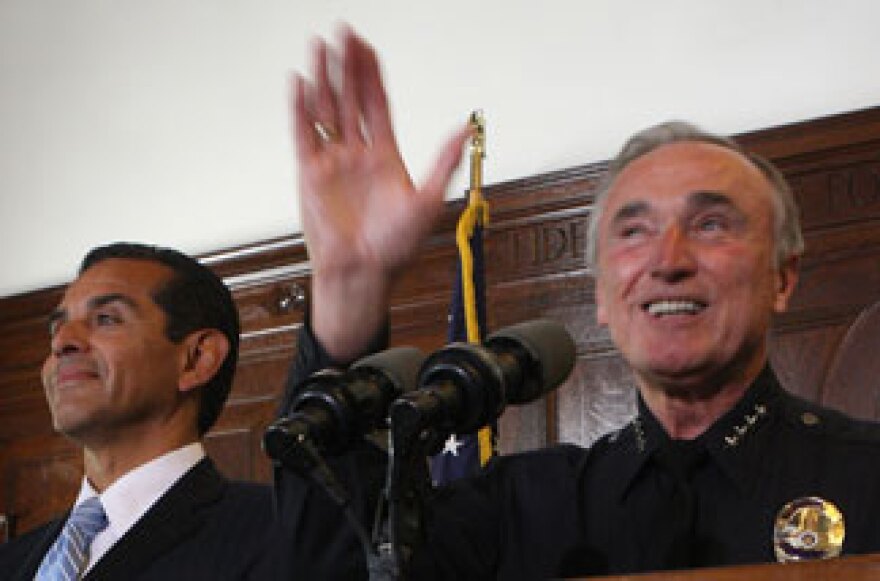This story is free to read because readers choose to support LAist. If you find value in independent local reporting, make a donation to power our newsroom today.
This archival content was originally written for and published on KPCC.org. Keep in mind that links and images may no longer work — and references may be outdated.
Bratton and the LAPD: A look back

On Saturday, Bill Bratton ends his high-profile and sometimes controversial run as chief of the Los Angeles Police Department. KPCC’s Frank Stoltze has the first of three stories that examine Bratton’s imprint on the LAPD.
Seven years ago in Los Angeles, crime was rising. Morale among the city’s police officers was falling. The U.S. Department of Justice determined that excessive force, false arrests, and unreasonable searches were routine in the L.A. Police Department.
As city attorney, Jim Hahn saw lawsuits pile up against the LAPD. Even as he negotiated with the federal government over how it would monitor L.A.’s police, he knew the Justice Department was right.
"The charge of racial profiling kept coming again and again," said Hahn. "That depending on what your racial background was, you were going to be treated differently by LAPD when you were pulled over for a traffic stop.
When he became mayor, Hahn dumped then-LAPD chief Bernard Parks. He found a replacement close by. Bill Bratton, a former New York city police commissioner, was tracking reforms at the LAPD for the federal government. Bratton told his wife, attorney Rikki Klieman, that he wanted to lead the department.
"He believed that in that L.A. job, that he was the only person in America who would be able to do the following things: give that department back its feeling of morale, go into partnership," said Klieman.
Bratton’s goals matched Hahn’s. In his first speech after his swearing-in, the new chief directly addressed the rank and file.
"I am going to talk very bluntly to you," said Bratton. "The citizens of this city need you back in those streets. They don't need you smiling and waving. They need you out of those cars, on those corners, in those parks, taking back those streets that unfortunately so many have been lost."
"When Chief Bratton came, he really changed things – really pro-police," said Officer James Stout.
Like so many within the LAPD, Stout was skeptical of an outsider running the notoriously insular department. The veteran motorcycle cop changed his mind as Bratton relaxed what officers considered a heavy-handed discipline system, provided flexible work schedules, and upgraded equipment.
"He got us motorcycles with ABS brakes, you know?" said Stout. "And before we never had ABS brakes. And I think it’s saved a lot of lives since he’s done that."
LAPD Captain Eric Davis, a 28-year veteran, said Bratton encouraged creativity. He echoed others who said previous chiefs had only occasionally allowed officers to think for themselves.
"That was always prefaced with ‘don’t make a mistake,’" said Davis. "Now you’re given that opportunity to try different strategies and if it doesn’t work, we can say ‘this one didn’t work, but, well, try it this way’ as opposed to ‘it didn’t work, your career is stymied.'"
Bratton instituted Compstat, a computer program that closely tracks crime. It’s helped commanders decide where to deploy resources – and it’s helped the chief to hold them accountable for results. Greg Ridgeway directs the Center on Quality Policy at RAND, a Santa Monica-based think tank.
"This coupling of both intensive statistical analysis with an intense management style appears to be very effective," said Ridgeway.
In another break from department culture, Bratton reached out to other local and federal agencies for help on various task forces. L.A. County District Attorney Steve Cooley said the chief has led by example too. He recalled a time he saw Bratton alongside his black LAPD SUV with his driver.
"Here he was out in the street and he had detained two individuals who had been putting up illegal signs in the Hollywood area, and so I got out and asked if he needed a little back, and he welcomed it," said Cooley.
In Bratton’s first year as chief, homicides fell by 25 percent, and have kept falling ever since.
A department that once had a hard time keeping officers now turns potential applicants away. Twenty-eight-year-old Cassandra Lewis graduated from the police academy this month.
"Everyone knows Chief Bratton and everyone knows what he’s done for the department and to work even for, you know, 10, 20 days, to work under him is such a great honor, and to shake his hand today and have his signature on my diploma is such a great honor that can’t be topped," said Lewis.
Tomorrow, a survey of Bratton’s efforts to make the LAPD a kinder, gentler law enforcement agency.








